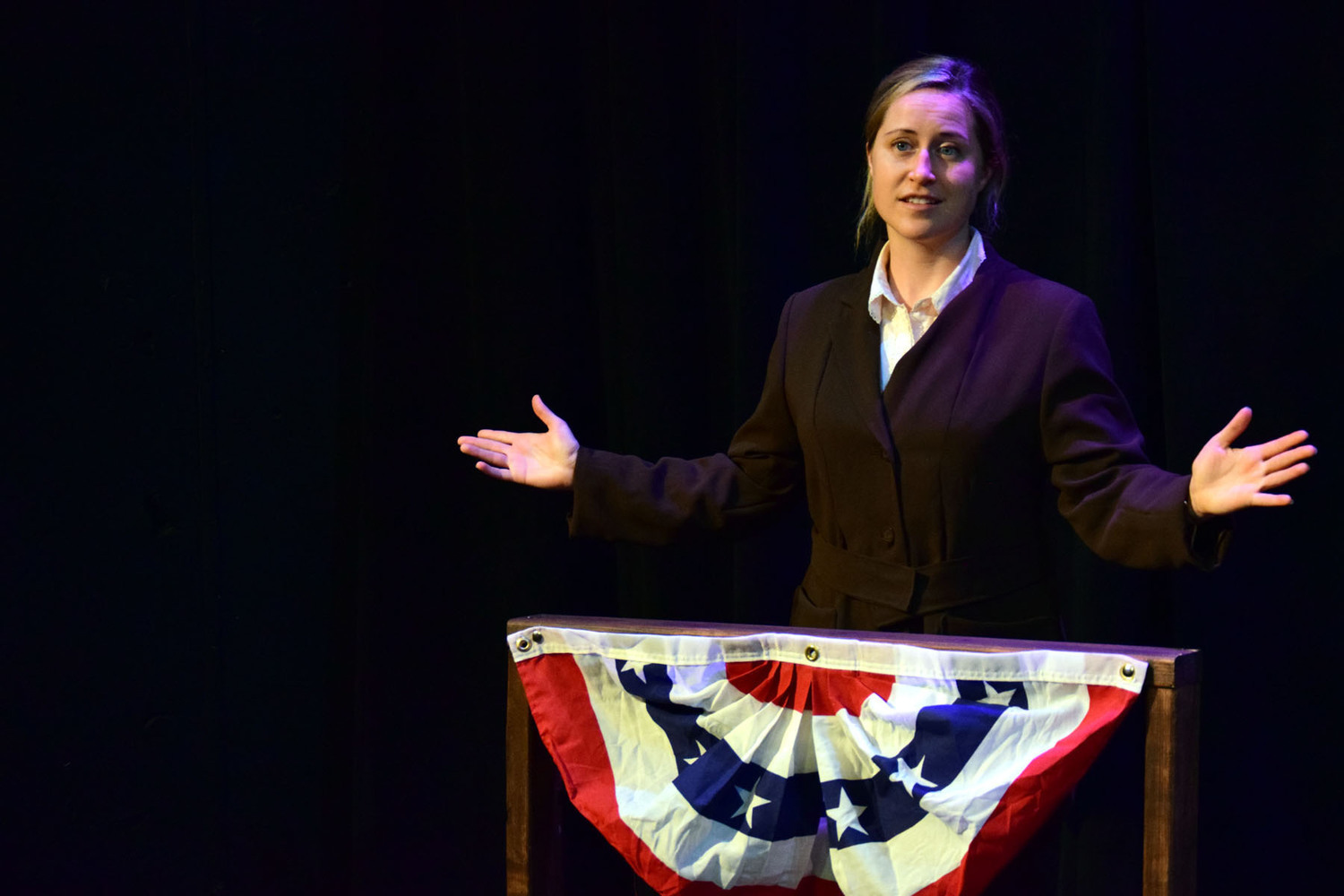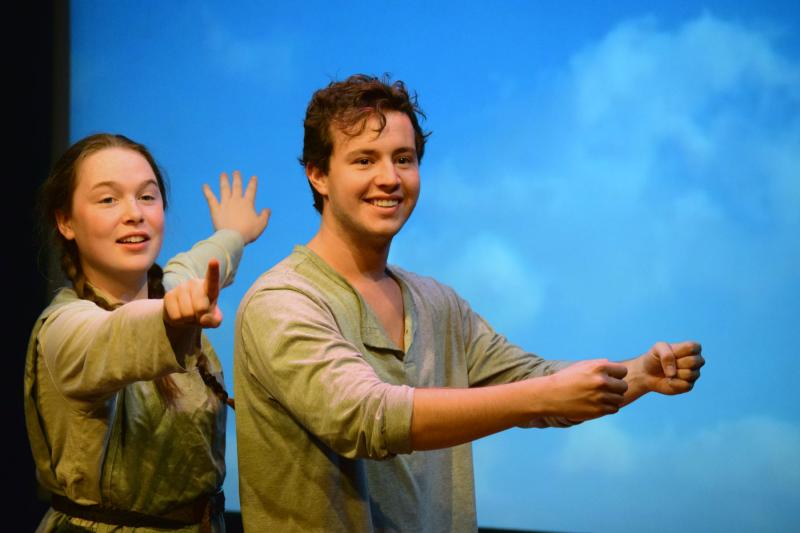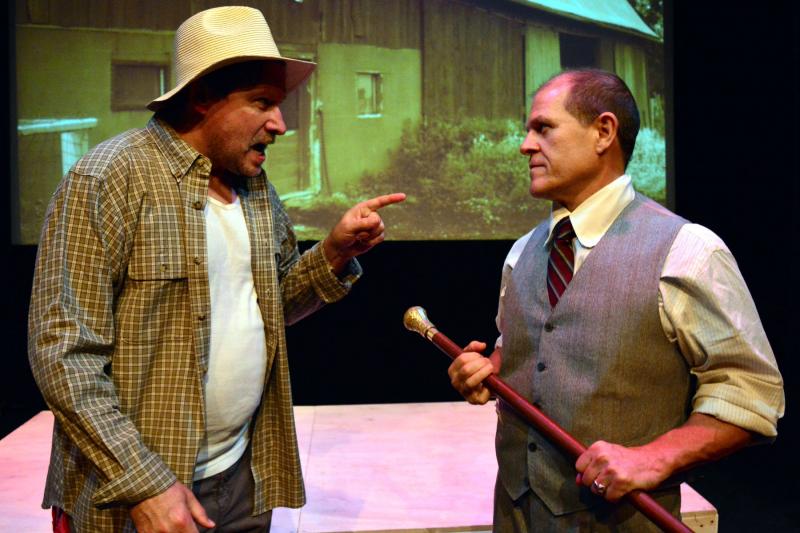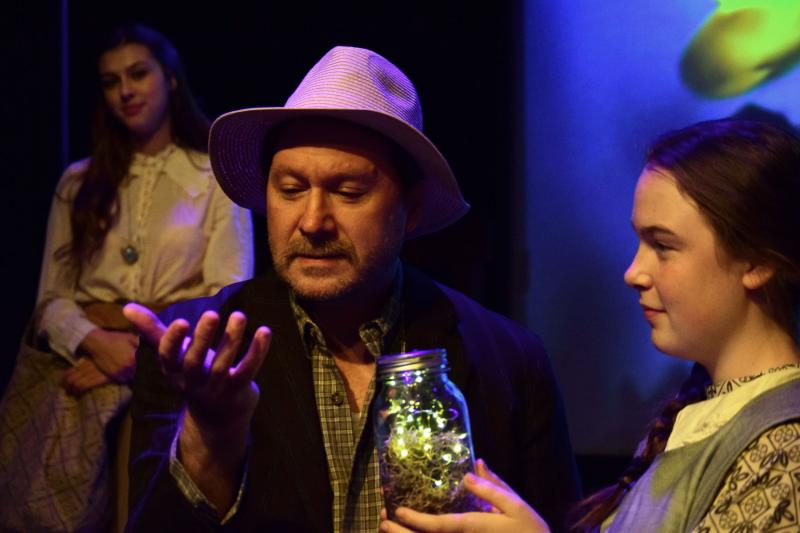Review: FIRE IN A DARK HOUSE Is More Timely Than Ever

The year was 1918. We were four years into World War 1. Anti-German notions swept across the country and preyed upon German-Americans, calling them spies, traitors, and as President Wilson once said, "hyphenated Americans" because their loyalty was divided.
On Thursday night, audience members got a glimpse of this fervor in the world premiere of Mona Z. Smith and Traci Mariano's play, FIRE IN A DARK HOUSE. Taking place at a small farm in a small town somewhere in the Midwest, FIRE put the spotlight on how xenophobic Americans viewed German-Americans, and how one powerful person can influence minds with dangerous propaganda. (Sound familiar?)
Inspired by true events involving Smith's ancestors, FIRE's message reflected on themes resonating in 2018; but the play also depicted how a familial bond is the strongest tie people have.
The play opened on the outside of Carl Roebling's (Andrew J. Langton) family farm as his middle daughter, Rose (Augusta Mariano), shucked peas on the front porch. Rose's younger sister Willie (Tallula Henderson) hid underneath as a playtime activity. Through their exchange of dialogue, we began to realize Rose was not only Willie's sister. She was her caretaker, her nurturer but also her confidant. However, Willie had an affinity for fire, and that plus the constant overseeing of Willie began to take a toll on Rose.

Carl's only son Henry (Sanford Reed) was introduced as a fun-loving older brother who was conflicted between his devotion to his ancestral homeland and his birth homeland. His father saw him taking over the Roebling farm when he was older, but by the end of FIRE Henry made it clear where his loyalty resided.
Mary (Margy Love), the eldest of Carl's four children, came back to the farm for a visit after her husband enlisted in the army, but more so because Carl, Henry and Rose sent her letters pleading for her help. Carl and Henry needed help persuading Rose the boy she was in love with was not the right man for her, and Rose needed Mary to look after Willie so she can finally break free from her father's overbearing hold.
Mary brought with her a disdain for her alcoholic husband and the energy to retaliate against Simon Lick, the town's main perpetrator behind anti-German propaganda. A suffragette and feminist, Mary was concerned about her German-American background but also desired more freedom for women.
Carl was an interesting character. He was the man of his household and exuded that masculinity by being brazen and rough with his mannerisms and dialogue. Yet, I noticed a change when he put Willie to bed in one scene and you could hear him singing a lullaby offstage. Normally I'd view any talking behind the curtain a distraction and nuisance (especially when an actor is speaking on stage), but I thought the direction given here added depth to the character and to the play itself.
James Lick (Aaron Stevenson) was Rose's love interest who adored Shakespeare and also getting away from his father, Simon. The two forged a plan to escape but James' need to make his father proud outweighed his love for Rose, and he therefore volunteered for the army.

Simon Lick (Paul McCrillis) was a stately and pretentious man. His overbearingness contrasted with Carl's, for Simon wanted to live vicariously through his son because he never got the chance to serve in the army. Carl, on the other hand, wanted what was best for his family but just had an interesting way of showing it.

With all of that being said, the true standout of the seven-member cast was Tallula. For being such a young actor, she understood her blocking and her character very well, and Willie was probably the most well developed character in the entire show. I felt she gave her heart and soul to the role while other actors were lackluster in their performances. One of my favorite things Tallula brought to the table was her ability make the audience laugh. In my opinion, comedy is difficult to grasp, but her timing and delivery (both via articulation and acting) made a solemn plot humorous.

and Tallula Henderson
I also liked Andrew's performance as Carl. His depiction showed a strong-willed, passionate individual. There would be times he'd unintentionally interrupt Margy or another actor with his line, but I didn't see this as a huge issue. I viewed it as a naturally flowing conversation rather than an actor reciting his lines to another actor. It made his scenes more realistic. Andrew gave Carl this great dry sense of humor, which I loved. To me, I find a dry sense of humor in a character funnier than what was supposed to be a funny character. Lines were said nonchalantly, and if you didn't listen carefully, you would only be laughing because the rest of the audience was.
The two who I felt fell flat for most of the play were Augusta and Sanford. I found them both to be very one note and show little interest in the way they delivered their lines. I didn't feel this spark or connection to them, and their characters were ones I wouldn't remember. I thought Augusta's sisterly connection with Tallula was believable but only in the way she acted toward Tallula. These two also lacked serious energy in their performances. Sanford didn't provide any sort of inflection or tone in his voice to depict a mood, so I was never sure how to feel toward his character. Augusta at least used inflection and tone, but it never ranged to create a sense of depth for Rose.
Although the last scene of the show was incredibly melodramatic, it was supposed to make the audience feel a certain way. Augusta's performance during that scene was dull and didn't move me.
But looking at the show from a larger picture, I think Smith and Mariano's decision to debut it during this political arena was smart. It may have had some flaws but the message intended for the audience was clearly envisioned. The America we live in is a tumultuous country, and it's important for us to understand history should never repeat itself.
I didn't want to bring politics into this, so I'll make it quick. This timely piece brings to light what it means to be an immigrant and an American, two hotly debated words within the White House. It shouldn't matter where someone is from or the color of his or her skin because immigrants built America into the beautiful melting pot it is today.
FIRE IN A DARK HOUSE is open for two more shows Nov. 8 and Nov. 15 (Thursdays) at 8 p.m. at the Whitefire Theatre in Sherman Oaks (13500 Ventura Blvd.). General admission is $35; tickets for seniors, students and military members with ID are $25. For tickets and more information, visit fireinadarkhouse.bpt.me or call 800-838-3006.
Photo credit: Doug Engalla
Reader Reviews
Videos

